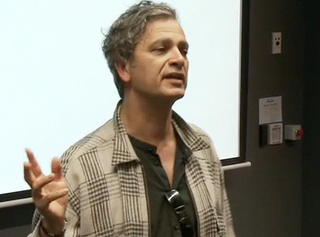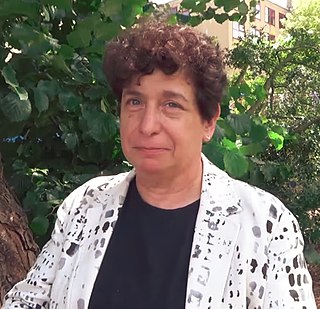Related Research Articles

Jürgen Habermas is a German social theorist in the tradition of critical theory and pragmatism. His work addresses communicative rationality and the public sphere.

Karl Heinrich Marx was a German philosopher, economist, historian, sociologist, political theorist, journalist, critic of political economy, and socialist revolutionary. His best-known titles are the 1848 pamphlet The Communist Manifesto and the four-volume Das Kapital (1867–1883). Marx's political and philosophical thought had enormous influence on subsequent intellectual, economic, and political history. His name has been used as an adjective, a noun, and a school of social theory.

The Frankfurt School is a school of social theory and critical philosophy associated with the Institute for Social Research, at Goethe University Frankfurt in 1929. Founded in the Weimar Republic (1918–1933), during the European interwar period (1918–1939), the Frankfurt School initially comprised intellectuals, academics, and political dissidents dissatisfied with the contemporary socio-economic systems of the 1930s. The Frankfurt theorists proposed that social theory was inadequate for explaining the turbulent political factionalism and reactionary politics occurring in 20th century liberal capitalist societies. Critical of both capitalism and of Marxism–Leninism as philosophically inflexible systems of social organization, the School's critical theory research indicated alternative paths to realizing the social development of a society and a nation.
Social theories are analytical frameworks, or paradigms, that are used to study and interpret social phenomena. A tool used by social scientists, social theories relate to historical debates over the validity and reliability of different methodologies, the primacy of either structure or agency, as well as the relationship between contingency and necessity. Social theory in an informal nature, or authorship based outside of academic social and political science, may be referred to as "social criticism" or "social commentary", or "cultural criticism" and may be associated both with formal cultural and literary scholarship, as well as other non-academic or journalistic forms of writing.

Social philosophy examines questions about the foundations of social institutions, social behavior, and interpretations of society in terms of ethical values rather than empirical relations. Social philosophers emphasize understanding the social contexts for political, legal, moral and cultural questions, and the development of novel theoretical frameworks, from social ontology to care ethics to cosmopolitan theories of democracy, natural law, human rights, gender equity and global justice.

Robert C. Solomon was a philosopher and business ethicist, notable author, and "Distinguished Teaching Professor of Business and Philosophy" at the University of Texas at Austin, where he held a named chair and taught for more than 30 years, authoring The Passions: Emotions and the Meaning of Life (1976) and more than 45 other books and editions. Critical of the narrow focus of Anglo-American analytic philosophy, which he thought denied human nature and abdicated the important questions of life, he instead wrote analytically in response to the continental discourses of phenomenology and existentialism, on sex and love, on business ethics, and on other topics to which he brought an Aristotelian perspective on virtue ethics. He also wrote A Short History of Philosophy and others with his wife, Professor Kathleen Higgins.

Marxism is a left-wing to far-left method of socioeconomic analysis that uses a materialist interpretation of historical development, better known as historical materialism, to understand class relations and social conflict and a dialectical perspective to view social transformation. It originates from the works of 19th-century German philosophers Karl Marx and Friedrich Engels. As Marxism has developed over time into various branches and schools of thought, no single, definitive Marxist theory exists.

Robert Neelly Bellah was an American sociologist and the Elliott Professor of Sociology at the University of California, Berkeley. He was internationally known for his work related to the sociology of religion.

Axel Honneth is a German philosopher who is the Professor for Social Philosophy at Goethe University Frankfurt and the Jack B. Weinstein Professor of the Humanities in the department of philosophy at Columbia University. He was also director of the Institut für Sozialforschung in Frankfurt am Main, Germany between 2001 and 2018.

Andrew Feenberg is an American philosopher. He holds the Canada Research Chair in the Philosophy of Technology in the School of Communication at Simon Fraser University in Vancouver. His main interests are philosophy of technology, continental philosophy, critique of technology and science and technology studies.
Articles in social and political philosophy include:

The sociology of literature is a subfield of the sociology of culture. It studies the social production of literature and its social implications. A notable example is Pierre Bourdieu's 1992 Les Règles de L'Art: Genèse et Structure du Champ Littéraire, translated by Susan Emanuel as Rules of Art: Genesis and Structure of the Literary Field (1996).
Carlos Alberto Torres Novoa is a distinguished professor.

Nikolas Kompridis is a Canadian philosopher and political theorist. His major published work addresses the direction and orientation of Frankfurt School critical theory; the legacy of philosophical romanticism; and the aesthetic dimension(s) of politics. His writing touches on a variety of issues in social and political thought, aesthetics, and the philosophy of culture, often in terms of re-worked concepts of receptivity and world disclosure—a paradigm he calls "reflective disclosure".

Knowledge and Human Interests is a 1968 book by the German philosopher Jürgen Habermas, in which the author discusses the development of the modern natural and human sciences. He criticizes Sigmund Freud, arguing that psychoanalysis is a branch of the humanities rather than a science, and provides a critique of the philosopher Friedrich Nietzsche.

A critical theory is any approach to social philosophy that focuses on society and culture to reveal, critique and challenge power structures. With roots in sociology and literary criticism, it argues that social problems stem more from social structures and cultural assumptions than from individuals. It argues that ideology is the principal obstacle to human liberation. Critical theory finds applications in various fields of study, including psychoanalysis, sociology, history, communication theory, philosophy and feminist theory.

Das Kapital, also known as Capital: A Critique of Political Economy or sometimes simply Capital, is a foundational theoretical text in materialist philosophy, critique of political economy and politics by Karl Marx. Marx aimed to reveal the economic patterns underpinning the capitalist mode of production in contrast to classical political economists such as Adam Smith, Jean-Baptiste Say, David Ricardo and John Stuart Mill. While Marx did not live to publish the planned second, third and fourth parts, the second and third volumes were completed from his notes and published after his death by his colleague Friedrich Engels; the fourth volume was completed and published after Engels's death by Marxist philosoper Karl Kautsky. Das Kapital is the most cited book published before 1950 in the social sciences.

Joan Claire Tronto, is professor of political science at the University of Minnesota, and was previously professor of women's studies and political science at Hunter College and the Graduate School, City University of New York.
Carol C. Gould is an American philosopher and feminist theorist. Since 2009, she has taught at City University of New York, where she is currently Distinguished Professor of Philosophy at Hunter College, and in the Doctoral Programs of Philosophy and Political Science at the CUNY Graduate Center, where she is Director of the Center for Global Ethics and Politics at the Ralph Bunche Institute. Gould is also editor-in-chief of the Journal of Social Philosophy. Her 2004 book Globalizing Democracy and Human Rights received the 2009 David Easton Award which is given by the American Political Science Association "for a book that broadens the horizons of contemporary political science." Her 2014 book Interactive Democracy: The Social Roots of Global Justice received the 2015 Joseph B. Gittler Award from the American Philosophical Association for "for an outstanding scholarly contribution in the field of the philosophy of one or more of the social sciences."
Raphael Sassower is a professor of philosophy at the University of Colorado Colorado Springs (UCCS). His academic contributions have been in the fields of economics, medical theory and methodology, science and technology, postmodernism, education, aesthetics, and Popperian philosophy. He is also a leader in the field of postmodern technoscience.
References
- ↑ "George E. McCarthy personal page-Books, biography, courses etc". Kenyon College. Retrieved December 17, 2019.
- 1 2 "Royal Rhodes". Kenyon College. Retrieved December 21, 2019.
- ↑ McCarthy, George E. (2018). Marx and Social Justice – Ethics and Natural Law in the Critique of Political Economy. Historical Materialism Book Series. Vol. 147. Haymarket Books. ISBN 978-16-08-46011-3.